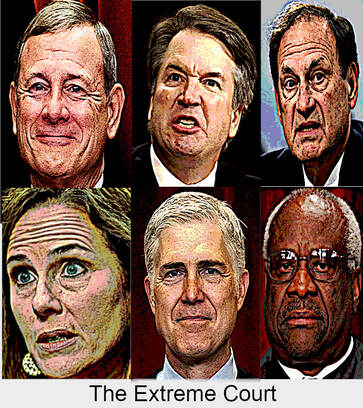
The last two days of the Court’s term saw three breathtaking decisions that will have an immediate adverse impact on tens of millions of Americans. While the defeat of President Biden’s student loan forgiveness program and the decision allowing a Colorado website designer (who hasn’t yet designed any websites) to refuse to work on wedding websites for LGBTQ persons deserve their own detailed analyses, I want to focus on the Harvard and University of North Carolina cases that ended affirmative action in college admissions.
To arrive at this result, the Court’s right-wing supermajority shows that it lives in an alternative fact universe divorced from reality much like their Republican allies in Congress, GOP presidential aspirants and the MAGAverse. In this fantasy realm, everyone—Whites, Blacks, Latinos, Native Americans, Asians, etc.—has an equal opportunity to rise on their own merits. This is the line that ex-President Trump and former Vice President Pence adopted in response to the Court’s ruling. The Justices have upended decades of American jurisprudence in order to achieve the political aims of the Republican Party.
Rising on merit is, of course, a fiction. Not only do racism, prejudice and discrimination persist in today’s America, they are becoming more entrenched thanks in large part to the evils of Trumpism. The Trump Era saw hate crimes and anti-minority activities skyrocket. Even out of office, Trump continues to fan the flames of white supremacy at every opportunity. As Justice Jackson wrote in her dissent, “Deeming race irrelevant in law does not make it so in life.”
Chief Justice Roberts, writing for the majority, invoked the Equal Protection Clause of the 14th Amendment as requiring a race-neutral consideration of college applicants. Apparently, he is unaware that the 14th Amendment, ratified just after the Civil War, was also the first endorsement of affirmative action to compensate for the evils of slavery. The Equal Protection Clause permits race-based initiatives narrowly tailored to meet a compelling government interest. Roberts’ opinion carves out an exception for military academy affirmative action admission programs. Diversity in the armed forces, according to Roberts, meets that test while other college admission programs, designed to achieve diversity in American society overall, do not. Wow!
In fact, the Equal Protection Clause was used to justify a number of what amounted to affirmative action programs—such as the Freedman’s Bureau Acts—after the Civil War to help former slaves alleviate some of slavery’s ills and adjust to their new reality. Justice Sotomayor pointed this out in her dissent.
This decision is not the first time the Court conservatives have pretended that racial inequality no longer exists in order to realize right wing extremist goals. See, for example, the Roberts Court decisions gutting the Voting Rights Act of 1965, justifying these disastrous, anti-democratic rulings by claiming that minority discrimination is no more, completely ignoring the barrage of voter suppression laws enacted by Republican state legislatures nationwide that fall most heavily on Black and Brown communities.
The supreme irony is that five of the six justices in the majority are beneficiaries of extraordinary privilege while the other is himself the beneficiary of affirmative action. The last time I looked, none of them grew up having to hunker down in terror in their homes while drive-by shooters shot up their neighborhoods.
This decision signals what will likely happen next:
- A precipitous drop in the number of minority students admitted into college, especially into elite, highly selective schools. In states that have already banned affirmative action in college admissions, Black enrollment has plunged (down by almost 50 percent in Michigan). The story is similar in California.
- The decision may portend the death of affirmative action programs in corporate hiring and in government contracting and all other areas of American life.
- College application essays may loom larger in admission decisions. Roberts noted that “Nothing prohibits universities from considering an applicant’s discussion of how race affected the applicant’s life, so long as that discussion is concretely tied to a quality of character or unique ability that the particular applicant can contribute to the university.” The downside of this is that, with essays looming larger in admission decisions, the temptation for applicants to use artificial intelligence programs to write their essays may increase. The challenge for admissions offices to distinguish AI essays from those written by applicants will be daunting.
- To the extremely limited extent something good comes out of this retro decision, it is this: The decision throws open the door to legal challenges to legacy preferences for the children of alumni, as well as preferential admission programs for big donors’ kids, and the children of faculty and celebrities. If minority affirmative action admissions program must go, then these preferences should also disappear. And what about affirmative action for athletes?
This decision is at least as much political as legal. It represents a big success for the Republican Party’s 40+ year effort to “re-disadvantage” minorities, punishing them for voting overwhelmingly Democratic and suppressing their vote (blessed by the Court—see above) in order to win future elections.
Dick Hermann
July 1, 2023


 RSS Feed
RSS Feed